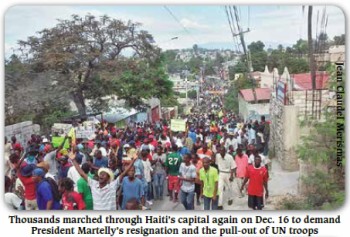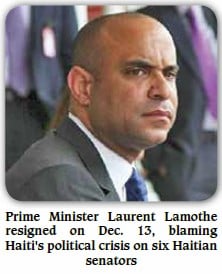Haiti: Police and UN Fire on Swelling Demonstrations Demanding President Martelly Step Down

Prime Minister Laurent Lamothe resigned at almost midnight on Sat., Dec. 13, culminating a tumultuous week of demonstrations, diplomatic theater, and backroom political maneuvering.
But the move, which some opposition leaders had known was coming for about two weeks, was too little, too late. Another giant march of thousands surged through Port-au-Prince on Dec. 16, the 24th anniversary of the 1990 landslide victory of President Jean-Bertrand Aristide, demanding President Michel Martelly’s resignation and the immediate withdrawal of the remaining 6,600 United Nations military occupation troops deployed in Haiti since June 2004 as the UN Mission to Stabilize Haiti (MINUSTAH).
“Lamothe was just the smallest part of a trinity holding Haiti down,” said Oxygène David of the Dessalines Coordination (KOD), a party formed in February. “The other two elements are Martelly and MINUSTAH. They also must go for Haiti to have democracy and sovereignty.”
Jordanian MINUSTAH soldiers fired leveled weapons at a huge anti-Martelly demonstration on Dec. 12 in Port-au-Prince, killing one man, Jean Mario, and wounding several others, including Monvil Gétro, Vladimir Castry, and Jeanel Pierre. Several videos,which have already had tens of thousands of views, show UN soldiers pointing and shooting directly at protestors, who respond with jeering, chanting, and rock-throwing.
 The demonstrations of Operation Burkina Faso, as the uprising is called, continued in the capital on Dec. 13 but were dispersed by police gunfire and teargas at the Champ de Mars in downtown Port-au-Prince. A video by Le Nouvelliste shows the body of a demonstrator who had been clearly shot through the chest. According to the Miami Herald, police spokesman Gary Desrosiers said “no one died” and “there were no great incidents,” claiming that police were investigating the death. He told the Herald it looked like people “put the body there.”
The demonstrations of Operation Burkina Faso, as the uprising is called, continued in the capital on Dec. 13 but were dispersed by police gunfire and teargas at the Champ de Mars in downtown Port-au-Prince. A video by Le Nouvelliste shows the body of a demonstrator who had been clearly shot through the chest. According to the Miami Herald, police spokesman Gary Desrosiers said “no one died” and “there were no great incidents,” claiming that police were investigating the death. He told the Herald it looked like people “put the body there.”
U.S. Secretary of State John Kerry cancelled his planned Dec. 12 visit to Haiti due to the unrest and the failure of two State Department officials, Thomas Shannon and Thomas Adams, to broker a deal during their visit last week trying to keep the Martelly regime from crumbling.
Praise for Lamothe from U.S. Ambassador Pamela White and former President Bill Clinton also helped fan the flames of rebellion. “This is the most consistent and decisive government I’ve ever worked with across a broad range of issues,” Clinton told the Herald, enraging many Haitians.
There were also demonstrations on Dec. 12 and 13 in Cap Haïtien, Gonaïves, Ouanaminthe, and Petit Goâve, where daily demonstrations block National Road #2 to the south. Martelly partisans such as former Sen. Youri Latortue in Gonaïves, deputy Kenston Jean-Baptiste in Cap Haïtien, and deputy Luckner Noël in Ouanaminthe tried to disperse demonstrators by firing weapons from official vehicles, wounding several people. But the uprising is in full swing, and such repression, like that of the Tonton Macoutes trying to save the Duvalier dictatorship in early 1986, is just gasoline on the fire.
 In his resignation speech, which was broadcast just after 1:30 in the morning, Lamothe made no mention of the demonstrations rocking the country but just listed the supposed accomplishments of his 31 months in office, during which he burned through $5.5 billion in international aid to Haiti while the population fell deeper into poverty and hunger. It sounded more like a campaign speech for the presidential run many expect he will mount in late 2015.
In his resignation speech, which was broadcast just after 1:30 in the morning, Lamothe made no mention of the demonstrations rocking the country but just listed the supposed accomplishments of his 31 months in office, during which he burned through $5.5 billion in international aid to Haiti while the population fell deeper into poverty and hunger. It sounded more like a campaign speech for the presidential run many expect he will mount in late 2015.
In a Dec. 15 interview with Bloomberg News, Lamothe said that “the opposition, of course, is never going to want the government to succeed” and blamed the political crisis on six senators who “have been sitting on the electoral law for the past nine months… so Haiti cannot have elections.” He also struck a martyr-like pose, saying he had made the “ultimate sacrifice” to “clear the way forward for elections” and had no plans “right now” for any presidential bid.
“As I always said, I would never be part of the problem, and I would always be part of the solution to Haiti’s problems,” Lamothe said. “Being Prime Minister for 31 months, actually the longest serving Prime Minister, it was never about, you know, myself, it was always about Haiti and about the country moving forward.”
(One of the gems of the interview came from the Bloomberg interviewer herself who asked: “The fact that the opposition party, just as you said, will never want to see the government succeed, why don’t we focus on that? Shouldn’t that be a reason to nullify this opposition party? Because you need a strong government…”)
“Lamothe was in fact one of the links in the chain of catastrophes which have battered the country since May 14, 2011,” when Martelly was inaugurated, wrote Berthony Dupont in Haïti Liberté’s editorial this week. “But nothing has really been accomplished as long as Martelly remains in power.”

